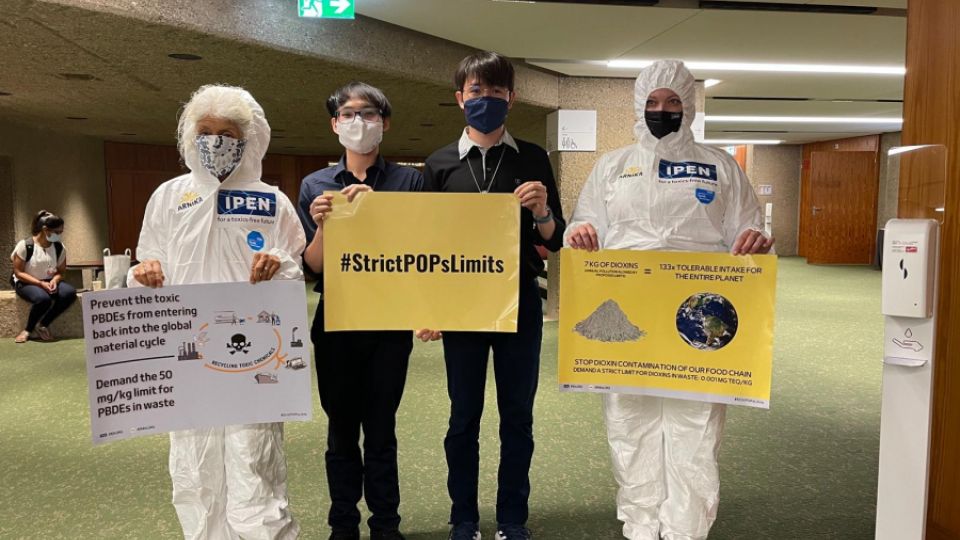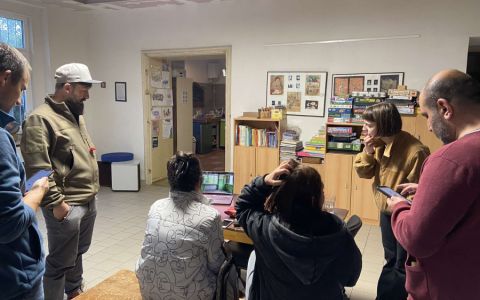A conference of the Parties to the Basel, Rotterdam, and Stockholm (BRS) Conventions is happening in Geneva. A delegation from the NGO Ecological Alert and Recovery – Thailand (EARTH) is also present. We are publishing an interview with Punyathorn Jeungsmar, EARTH’s communication officer, about the conventions’ impact on their activities in Thailand.
Are the Basel, Rotterdam, and Stockholm conventions important for the cases you are working on in Thailand?
As a developing nation, Thailand can benefit from international conventions that solve cross-border pollution problems. Basel is vital to the agricultural communities we work with in Tha Than, in Eastern Thailand. In that region, imported e-waste has been burned and dismantled in the open, causing severe damage to local food crops and health. In this same region, studies have found dioxin contamination in the soil. Therefore, the Stockholm Convention is becoming essential as it regulates persistent organic pollutants (POPs), including dioxins.
Stockholm is also becoming more critical in Thailand’s context. The government is pushing for more waste incinerators to solve the waste crisis, even though the burning of waste is a significant source of POPs. Last but not least, Rotterdam is substantial concerning right-to-know and PRTR campaigns.
In conclusion, the BRS conventions are frameworks through which we negotiate and work with the government to produce sustainable solutions to industrial pollution.
What expectations do you have from this year’s Conference of the Parties?
Certainly, we would like to see member states that have not ratified the Basel Ban Amendment [1], including Thailand, do so after this year's convention. We also hope to see significant progress in the international campaign for a Low POPs Content Limit. The delegates, including our representatives from Thailand, should support the 53 African nations’ call for stricter controls on POPs in waste. Because of the high current limits embedded in the Stockholm Convention, wealthy states can send much waste contaminated with POPs to countries like Thailand. There, the local facilities do not manage such waste properly. Lowering the limits would lead to less waste being imported into Thailand and its appropriate management.
We also believe that the Swiss-Ghanian proposal to change the categorization of e-waste will succeed. Electronic waste had previously been listed as “non-hazardous,” and the proposal moves it into Annex 2 as waste to be controlled. This would mean all e-waste will be handled appropriately with informed consent or prohibited from importation if found to be hazardous.
If you could show a single place in Thailand to the delegates, which one would it be and why?
Khok Sa-ad sub-district, Kalasin province, Northeastern Thailand. This subdistrict is the location of one of Thailand’s largest e-waste dumpsites. The place has been a de facto dump for e-waste since the 2000s. The locals in Khok Sa-ad traditionally practice agriculture but turned to sorting, dismantling, and burning waste before the local government’s ban. Several villages’ primary income source is sorting the e-waste surrounding this massive dumpsite. For instance, a local person told us they had even bought e-waste from an auction at the Laem Chabang international shipping port. These locals breathe in contaminated air and cook, eat, and sleep next to exposed copper wires, batteries, and circuit boards just because they need to make a living.
If we conceptualize the hazardous waste trade as a chain, Khok Sa-ad is the very end of that chain. And we want the delegates responsible for enacting international laws such as Basel and Stockholm to see the unbearable living conditions at the end of the chain.
GALLERY ⇨ Exploring the 'World's E-waste Dump' in Thailand
Is the topic of toxics related to importing plastic and electronic waste into Thailand? How could the new UNEP plastic treaty help with that?
Imported electronic waste and plastics are a source of toxic chemicals in many communities in Thailand. Electronic waste is a source of POPs, chemicals that make the environment toxic for a long time. Much of the municipal, and e-waste in Thailand contain plastics. When the waste is burned, substances such as dioxins are produced.
The recent “End Plastic Pollution” resolution aims to address plastic in its whole life cycle. EARTH welcomes the decision as plastic is hazardous as waste and as manufactured beads and recycled commodities. If we want to curb plastic pollution throughout life, countries must reduce their manufacturing and consumption of the material. We shall avoid burning waste because it is a false solution. The treaty’s goals have to be to prevent the harm caused by plastic before the damage is done. If we implement the treaty genuinely, it is possible to eliminate toxic plastics.
You can find more information about Arnika’s and EARTH’s joint project here.
[1] The Ban Amendment, adopted by the parties to the Basel Convention in 1995, prohibits the export of hazardous wastes from member states of the European Union, Organization for Economic Cooperation and Development (OECD), and Liechtenstein to all other countries.







